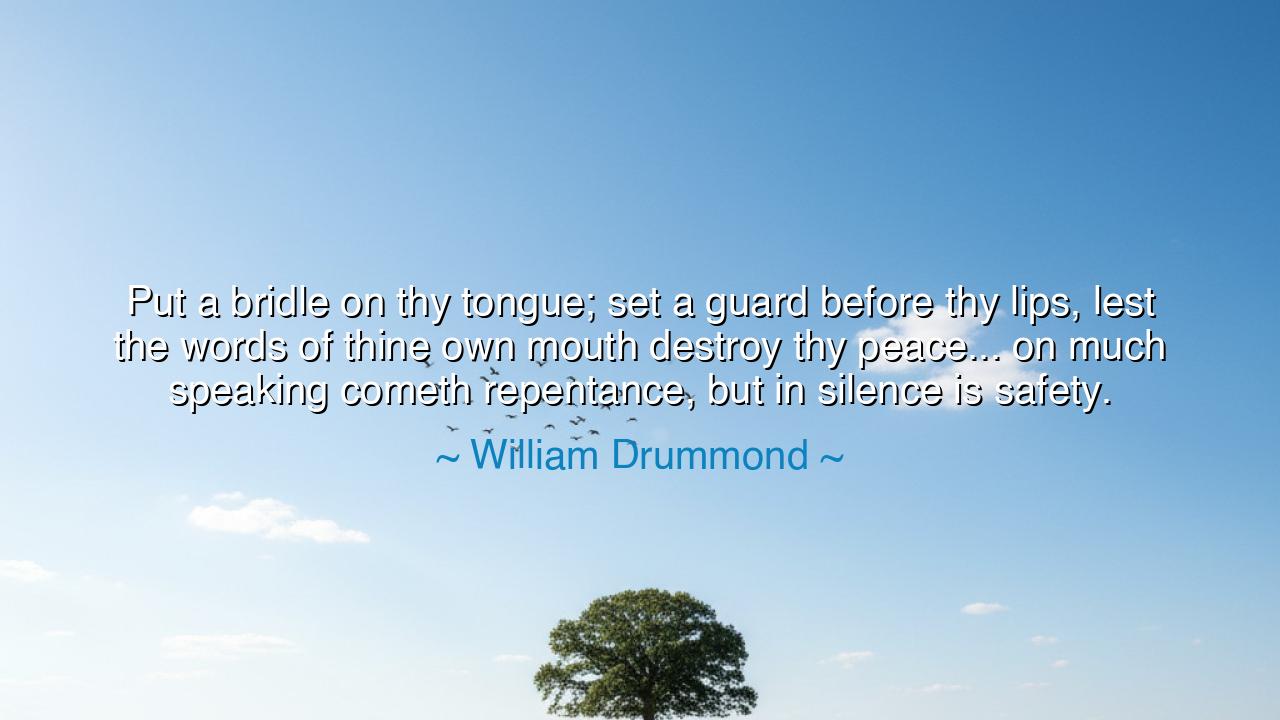
Put a bridle on thy tongue; set a guard before thy lips, lest
Put a bridle on thy tongue; set a guard before thy lips, lest the words of thine own mouth destroy thy peace... on much speaking cometh repentance, but in silence is safety.






The words of William Drummond—“Put a bridle on thy tongue; set a guard before thy lips, lest the words of thine own mouth destroy thy peace... on much speaking cometh repentance, but in silence is safety”—resound like the solemn voice of an elder warning the young of hidden snares. They speak to one of the oldest truths of mankind: that the tongue, though small, carries the power to wound, to divide, and to undo the peace of one’s own heart. Drummond, with the imagery of horse and rider, urges us to master our words as one masters a steed, lest they run wild and carry us into ruin.
The origin of this wisdom lies in the early 17th century, when Drummond of Hawthornden, a Scottish poet and thinker, composed his reflections on morality, faith, and conduct. In an age of political upheaval and religious tension, careless speech could lead to betrayal, strife, or even death. Thus, his counsel was not mere poetry, but survival—urging men to guard their tongues as soldiers guard their weapons. But beyond the turmoil of his own day, his words reach into eternity, for in every age, rash words bring regret, and measured silence brings peace.
History provides vivid illustrations of this truth. Consider the story of Socrates, condemned not for deeds but for words spoken too boldly in the marketplace of Athens. His tongue, though wielded with wisdom, provoked envy and fear, and the city silenced him with poison. Or think of kings who, in moments of anger, pronounced rash decrees that destroyed their own reigns—like Herod, who bound himself to a foolish oath and brought tragedy upon his house. In both cases, unbridled words led to ruin, proving Drummond’s warning true: “On much speaking cometh repentance.”
The meaning of Drummond’s words is deeply practical. He does not condemn all speech, but warns against excess, against thoughtless utterance, against the flood of words that drowns wisdom. For the tongue can reveal truth, but it can also betray secrets; it can build trust, but it can also destroy it in a moment. When he says “in silence is safety,” he reminds us that silence is not weakness but strength—the shield of the wise who know that not all thoughts deserve to be spoken, not all emotions need to be loosed.
The ancients, too, knew this truth. The Hebrew proverbs declare, “In the multitude of words, sin is not lacking; but he who restrains his lips is wise.” The Stoics taught the discipline of measured speech, urging men to speak only what is necessary, and to let silence do the rest. In every culture, silence has been revered as the companion of wisdom, while the babbler is counted a fool. Drummond’s words stand in this long tradition: to rule the tongue is to rule the self; to rule the self is to preserve one’s peace.
The lesson for us is clear: let us not be slaves to our tongues. Before speaking, let us ask: Will these words heal or harm? Will they preserve peace or destroy it? Better to withhold words in patience than to release them in haste and live in regret. For words, once spoken, cannot be recalled; they fly like arrows, and their wounds may linger for years. In silence, however, no harm is done, and the heart remains untroubled.
Practically, let each person cultivate the art of restraint. In anger, pause before speaking. In gossip, choose silence over betrayal. In counsel, speak less but with greater weight. And in daily life, remember that not every thought needs a tongue, not every feeling needs expression. By placing a bridle upon the tongue, we preserve our dignity, protect our peace, and walk in the path of wisdom.
Thus, Drummond’s words endure as a torch for all generations: “Put a bridle on thy tongue; set a guard before thy lips… on much speaking cometh repentance, but in silence is safety.” Let them be carved into the memory of the young and the old alike, for in mastering our words, we master ourselves, and in mastering ourselves, we find the safety and peace that few in this restless world ever attain.






AAdministratorAdministrator
Welcome, honored guests. Please leave a comment, we will respond soon